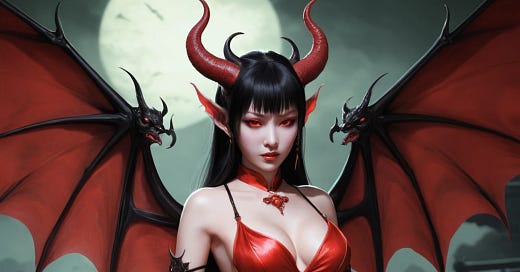Sino-American Trade & Political Warfare: Someone Killed CEO United . . . Health.
This is Why can't we have nice things.
Rare Earth Metals Boycott Retaliates Against Tariffs
The trajectory of U.S.-China trade relations is increasingly one of competition rather than cooperation. While China imagines itself poised to challenge American dominance by leveraging its perceived strategic advantages—most notably its control over rare earth metals—structural imbalances in wealth, creditworthiness, and institutional resilience between the two nations suggest that China would struggle to dictate terms to the United States. Nevertheless, the dynamics of this contest merit close examination, for they betray strategy.
The Myth of Resource Monopolies
China's leaders appear to be banking on their dominance in the production and refinement of rare earth elements—a critical component of modern technology—to coerce concessions from the U.S. However, history teaches us that resource monopolies are rarely as powerful as they seem. In 1973, Arab members of OPEC launched an oil embargo, hoping to leverage their control over energy supplies to influence Western foreign policy. While the embargo caused short-term economic dislocation, it ultimately spurred innovation, conservation, and the diversification of energy supplies in the West. Similarly, the United States is unlikely to remain dependent on Chinese rare earths indefinitely. Already, efforts are underway to develop alternative sources and recycling technologies, diminishing China's leverage.
Moreover, the strategic value of rare earths, though real, is overstated. The U.S. maintains dominance in semiconductor design and advanced manufacturing, the true "chokepoint" of modern technological ecosystems. As the global leader in capital formation and technological innovation, the U.S. can mobilize its resources to mitigate vulnerabilities, leaving China in the precarious position of a supplier dependent on external markets.
The Dollar's Enduring Dominance
China's aspirations to challenge the U.S.-led global economic order face another formidable obstacle: the enduring dominance of the U.S. dollar. Despite China's efforts to internationalize the renminbi, the dollar remains the preeminent medium of global trade and reserve currency. This is not merely a function of habit or inertia but a reflection of deep structural realities. The United States is a capital exporter with a highly liquid financial system, while China is a capital importer constrained by strict capital outflow controls. Even the euro, backed by some of the world's most advanced economies, failed to dislodge the dollar, underscoring the resilience of America's economic foundations.
This asymmetry is compounded by China's reliance on the U.S. consumer market. While the U.S. enjoys significant domestic demand and a diversified economy, China's growth model remains export-dependent. Any trade war initiated by Beijing would thus risk self-inflicted wounds, disrupting the very markets upon which its prosperity depends.
Hardliner economist Peter Navarro’s nomination for trade secretary underlines the fact of massive inbound US-China trade war, if the US imposed chip ban and EV tarriffs hadn’t already made that clear. I expect Europe will abstain and China will find capital and find markets in Europe as well as Africa and South America respectively. Economic stalemate and military containment of China is the likeliest outcome, and a cross-straits PRC-ROC war is unlikely.
Strategic Adaptation: Lessons from History
China's predicament is not without historical precedent. During the Cold War, the Soviet Union sought to outmaneuver the United States by rallying the "Global South" against Western imperialism. While this strategy yielded some diplomatic victories, it ultimately faltered due to the economic inefficiencies and ideological rigidity of the Soviet system. Similarly, China's efforts to align with developing nations against the U.S. are unlikely to yield a decisive advantage. While the numerical superiority of the world's poorer nations is undeniable, their diversity of interests and dependence on both U.S. markets and international institutions limit their ability to form a cohesive bloc.
For China, the more promising path lies in a return to the strategy that characterized its rise in the late 20th century: a combination of overt friendliness and covert opposition. Under Deng Xiaoping and his successors, China pursued a pragmatic approach, integrating into the global economy while quietly building its capabilities. This strategy allowed China to avoid direct confrontation with the U.S., instead exploiting the opportunities created by globalization to enhance its own power.
Xi Jinping
However, the current leadership under Xi Jinping seems ill-suited to such subtlety. Xi's emphasis on centralized control, ideological purity, and assertive foreign policy marks a departure from the pragmatism of his predecessors. While this approach has consolidated his authority domestically, it has also heightened tensions abroad, particularly with the United States. Xi's reluctance to compromise reflects not only his personal style but also the constraints imposed by China's political system. The Chinese Communist Party (CCP) derives its legitimacy from its ability to deliver economic growth and project strength. A perceived retreat in the face of U.S. pressure could undermine this legitimacy, leaving Xi with little room to maneuver.
The Long Game: Patience as Strategy
The U.S.-China trade conflict is unlikely to produce a decisive "winner" in the short term. For Beijing, the key to long-term success lies in patience and adaptability. While the current dynamics favor the U.S., the global balance of power is not static. By investing in technological self-reliance, deepening ties with emerging markets, and tempering its confrontational rhetoric, China could position itself for a more favorable equilibrium in the decades to come.
As Chinese strategists often remind us, the dragon (龙) thrives not through brute force but through patience and cunning. Long game is Long. Whether Xi Jinping is capable of embodying this ethos remains to be seen. What is certain, however, is that the outcome of this contest will shape the geopolitical landscape of the 21st century, with implications that extend far beyond the realm of trade.
Free eBooks followed by Free Bonus Article & Word of the Day!
How to Learn the Chinese "Alphabet"!
Medical Interpreter’s Dictionary
Corporate Law and the Multinational Corporate Group
Point of Law: Corporations
Business Associations, Agency, Partnership, Corporations Law Quiz Questions for Final Exams and Bar Review
Quizmaster Point Of Law: Civil Procedure
Civil Procedure Law Flashcards Quiz Questions
Free till end of Friday, enjoy your day of rest, maybe go worship hm? If you like it please tell a friend.
New Releases: B0DP6GP9VP
B0DH449BY5
B0DNDCXV13
B0DMLZVFLL
B0DP3838Y9
Liberty Murder: A 4 Year Spree
The next four years in the United States will be stained with political violence. This isn’t a prediction born from idle speculation; it’s a grim forecast rooted in observable trends. The causes are multifaceted—Donald Trump’s criminality, the lawlessness within his faction, retaliatory violence against him, and the broader disintegration of political unity. The storm will be fueled further by the increasingly partisan application of criminal law, as seen in the weaponization of charges and the politically motivated pardoning of offenders like Hunter Biden. The violence won’t reach the apocalyptic levels of Weimar Germany, but it will echo the turbulence of the 1960s, with terrorism, assassinations, and a pervasive sense of national fracture.
Harbinger: A Nation on Edge
The signs are there for those who read. The attempted assassinations of Trump, aer like the starting gun for a deadly sprint with razor sharp cleats ending in a kick boxing match, a fight to the finish. Trump, as both a symbol and a catalyst, embodies the divisive fault lines of America’s political landscape. His followers view him as a messiah whose legal troubles are not crimes but martyrdoms. His opponents see him as an existential threat, deserving not just legal justice but extrajudicial action. This dynamic invites violence.
A Growing Bloodletting
The violence will come from all sides. Already, political disputes are laced with threats and acts of aggression. Trump supporters have sent bomb threats to his opponents. Swatting incidents, where false emergency reports send armed police to innocent targets, are now common against Trump’s perceived adversaries. Even corporate America isn’t immune—UnitedHealth Group’s CEO was recently assassinated in an act that had political overtones. These aren’t isolated incidents but the early tremors of a broader quake.
Foreign Hands Stir the Pot
Foreign adversaries are poised to exploit this chaos. Russia’s SVR and China’s MSS, both masters of disinformation and destabilization, have every incentive to amplify America’s internal discord. For Russia, fostering violence weakens its primary geopolitical rival. For China, escalating the turmoil avenges the trade war and deflects attention from Taiwan and other flashpoints. The attack on Nancy Pelosi’s husband, Paul, stands out as a chilling example. Not long after Pelosi’s controversial visit to Taiwan, her husband was struck with a hammer. The symbolism—hammer and sickle—might be dismissed as coincidence, but in geopolitics, few things are accidental.
A Dystopian Reprieve of History
America’s descent into political violence will resemble the 1960s more than Weimar Germany. The 1960s saw assassinations—John F. Kennedy, Martin Luther King Jr., Malcolm X, and Robert F. Kennedy fell to bullets, among others. Urban riots exploded in cities across the nation. Political extremism birthed terrorist groups like the Weather Underground. Yet even then, the republic held.
In Weimar Germany, political violence was so widespread and deadly that it paved the way for authoritarian rule. America’s reprise, however, will be farcical rather than tragic. Trump’s attempts to position himself as a demagogue, while unsettling, lack the ideological coherence of Hitler’s rise. Yet, as Karl Marx quipped, history repeats itself—first as tragedy, then as farce.
The farce, however, will not be without casualties. Acts of terrorism and assassination will punctuate the next four years. Armed militias may escalate their confrontations. Political figures, journalists, and business leaders will be targets. And while the violence may not topple the republic, it will further erode public trust in its institutions.
Get Used to It
Four years of violence. That’s MAGA. It’s no excuse just because it’s inevitable. The polarization of American politics is no longer just a war of words—it’s a war of worlds. A war fought in courtrooms, in voting booths, in legislatures, and increasingly, in the streets.
Liberty Murder is the slow unraveling of a nation that once prided itself on peaceful transitions of power. It’s the cost of a democracy that turned freedoms into weapons. It’s the price America will pay for allowing its divisions to metastasize into something malignant. The next four years will test whether the republic can survive not just external threats, but the violence it inflicts upon itself.
Proof of Work.
Word of the Day
"Trade war":
French:
* Translation: guerre commerciale
* Sample sentence: "La Chine et les États-Unis sont très susceptibles de se lancer dans une guerre commerciale."
Spanish:
* Translation: guerra comercial
* Sample sentence: "China y Estados Unidos son muy propensos a entrar en una guerra comercial."
German:
* Translation: Handelskrieg
* Sample sentence: "China und die USA werden wahrscheinlich in einen Handelskrieg verwickelt."
Estonian:
* Translation: kaubandussõda
* Sample sentence: "Hiina ja USA on väga tõenäoliselt kaubandussõtta astumas."
Ukrainian:
* Translation: торгівельна війна (torgovelna viyna)
* Sample sentence: "Китай і США дуже ймовірно вступлять у торгівельну війну." (Kytai i SSHA duzhe ypravno vstupyat' u torgovelnu viynu.)
Russian:
* Translation: торговая война (torgovaya voyna)
* Sample sentence: "Китай и США, скорее всего, вступят в торговую войну." (Kitay i SSHA, skoree vsego, vstupyat' v torgovuyu voynu.)
Chinese (Simplified):
* Translation: (màoyì zhàn)
* Sample sentence: "" (zhōngguó hé měiguó hěn kěnéng jiārù màoyì zhàn.)













